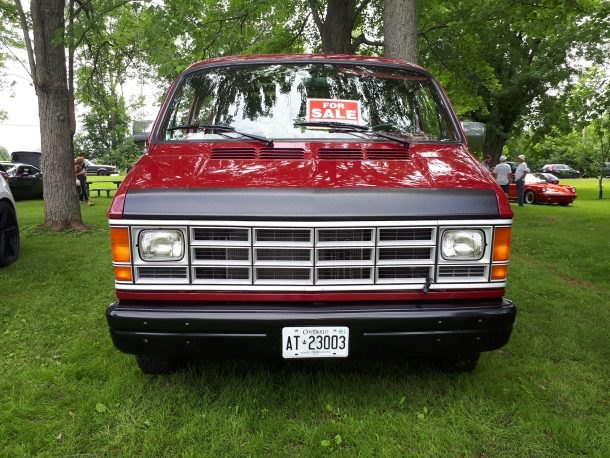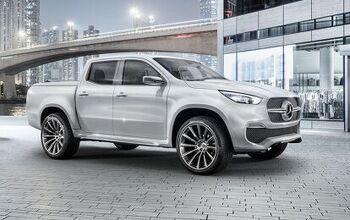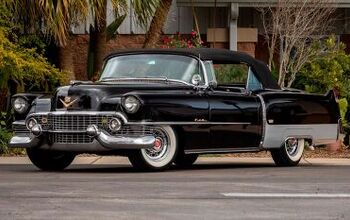QOTD: Is This Something We Should… Aspire To?

There was an odd bit of PR posted to Ford’s media site this week — something that’s not altogether surprising, given the current socio-economic climate. You know about vans, right? Thought so. While the Econoline van is gone and the Windstar/Freestar a distant memory, Ford still has two boxes on wheels ready for the taking.
How’d you like to live in one?
Ford’s story concerns women who live in their vans — in most cases, as a temporary hotel room while on the road, but in another case as a full-time thing. Yes, that Transit or Transit Connect can be your log cabin in the woods if you so choose. Just be ready with that thermal foil and drill, but be aware that modifications might void your warranty.
The message seems to be that empowerment, freedom, and rent-free (but not necessarily payment-free) living awaits. Of this, we have no doubt. Who doesn’t want to go camping with a large van? If you’re like me, and have a fear of tents — land sharks (bears) lurk everywhere, you know — then the cargo floor of a spacious commercial van seems like a pretty nice place to spend the night. On holiday? Think of the money you could save by choosing the Walmart parking lot over a suite overlooking the ocean. Hell, you might make friends with the owners of the RVs parked there.
But to live in a Transit Connect? To spend your life seeking safe spots to park at night while showering at the YWCA in the morning? (“You get used to picking the right spots, and you just rely on common sense,” says van dweller Tasha Rivard). Is that really the life we should aspire to, or even promote? Sure, if you’re the artsy, creative, connected type who wants to go where the wind takes you while a string of paying clients remains just an email away, have at it. If a city or job beckons you to put down roots, the rental listings await. Far be it for me to tell a woman (or man) what to do.
I’m just not sure if an automaker can expect much of a draw from this would-be customer base. Certainly, if you’re living the stereotypical nomad life, that van probably left its warranty coverage behind during the Clinton administration. It’ll be held together with chewing gum and paper clips.
This type of is a little more extreme than the vanning craze that spawned the vehicles you see here. It was expected that the cool guys driving these rigs owned or rented some sort of residence when they weren’t relaxing at the beach or drinking Miller and seeking out unwanted pregnancies outside the KISS concert.
So, tell me, B&B — am I overthinking this? Should automakers be allowed to promote their vehicles as rolling abodes free of guilt? And: have you ever felt the urge to live the van life yourself?
[Images: Steph Willems/TTAC, Ford Motor Company]

More by Steph Willems
Latest Car Reviews
Read moreLatest Product Reviews
Read moreRecent Comments
- Redapple2 Love the wheels
- Redapple2 Good luck to them. They used to make great cars. 510. 240Z, Sentra SE-R. Maxima. Frontier.
- Joe65688619 Under Ghosn they went through the same short-term bottom-line thinking that GM did in the 80s/90s, and they have not recovered say, to their heyday in the 50s and 60s in terms of market share and innovation. Poor design decisions (a CVT in their front-wheel drive "4-Door Sports Car", model overlap in a poorly performing segment (they never needed the Altima AND the Maxima...what they needed was one vehicle with different drivetrain, including hybrid, to compete with the Accord/Camry, and decontenting their vehicles: My 2012 QX56 (I know, not a Nissan, but the same holds for the Armada) had power rear windows in the cargo area that could vent, a glass hatch on the back door that could be opened separate from the whole liftgate (in such a tall vehicle, kinda essential if you have it in a garage and want to load the trunk without having to open the garage door to make room for the lift gate), a nice driver's side folding armrest, and a few other quality-of-life details absent from my 2018 QX80. In a competitive market this attention to detai is can be the differentiator that sell cars. Now they are caught in the middle of the market, competing more with Hyundai and Kia and selling discounted vehicles near the same price points, but losing money on them. They invested also invested a lot in niche platforms. The Leaf was one of the first full EVs, but never really evolved. They misjudged the market - luxury EVs are selling, small budget models not so much. Variable compression engines offering little in terms of real-world power or tech, let a lot of complexity that is leading to higher failure rates. Aside from the Z and GT-R (low volume models), not much forced induction (whether your a fan or not, look at what Honda did with the CR-V and Acura RDX - same chassis, slap a turbo on it, make it nicer inside, and now you can sell it as a semi-premium brand with higher markup). That said, I do believe they retain the technical and engineering capability to do far better. About time management realized they need to make smarter investments and understand their markets better.
- Kwik_Shift_Pro4X Off-road fluff on vehicles that should not be off road needs to die.
- Kwik_Shift_Pro4X Saw this posted on social media; “Just bought a 2023 Tundra with the 14" screen. Let my son borrow it for the afternoon, he connected his phone to listen to his iTunes.The next day my insurance company raised my rates and added my son to my policy. The email said that a private company showed that my son drove the vehicle. He already had his own vehicle that he was insuring.My insurance company demanded he give all his insurance info and some private info for proof. He declined for privacy reasons and my insurance cancelled my policy.These new vehicles with their tech are on condition that we give up our privacy to enter their world. It's not worth it people.”






































Comments
Join the conversation
Ford is actually advocating an illegal act. It's not lawful to be homeless, or a full-time RV'er, especially if you have funds to pay the fines. If you're homeless, live on dirt and broke, no one cares enforce US laws on you. Paying your rent/mortgage/utilities and otherwise "keeping a home" even if that's most of your bring-home pay, helps keep the US afloat and the wheels turning. It's also illegal to be "off grid". In fact, I don't know of any US state that establishes driver's licenses or IDs without 2 month's utility bills in your name.
I lived in what was later called a "Mini-van" for about 6 months almost 50 years ago. I was "between jobs" and did not have enough money from previous employment to pay first/last/deposit on an apartment. You learn how to do things differently in that situation. Of course this was long before the term "molester van" or the sticker "Don't Laugh, Your Daughter Might Be Inside". It was a lot easier to find a place to park for the night then. Less competition and fewer security guards. Years later when I got a van with built in camping stuff, beds, cabinets, water tank, sink, etc, it was easier to go on trips of up to two weeks. You learn where you can find showers for free or cheap (often in State Parks) and other tricks of the road. I don't think I'll have to do that again, but if necessary I know I can.